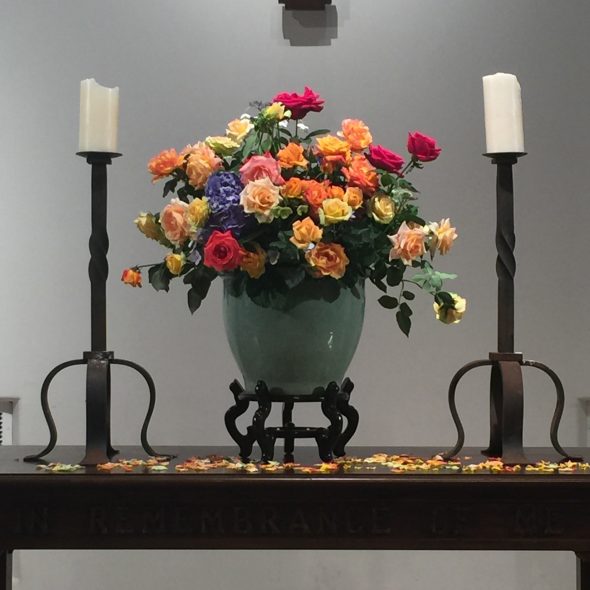As is my custom, whenever I am asked to offer prayer in public worship, I post it here. Today, I also had the privilege of leading the worship service, in the absence of both of our pastors. Another congregant, Dr. Greg Spencer, Professor of Communication at Westmont College, preached a powerful word on learning to hope well. This prayer was built on two passages — Psalm 33:18-22 and John 11:1-44. Immediately before this prayer, the congregation sang 3 verses of
“Be Still, My Soul.”
I want to invite you to still your souls for a few moments. To quiet and center yourselves in the presence of the God who loves you,
the Lord who is on your side,
the One who is your best, your heavenly friend.
I will extend this same invitation to stillness
at several points throughout today’s prayer.
Please pray with me:
Faithful Friend,
Loving Father,
Beautiful Savior,
Winsome Holy Spirit,
Blow through the cobwebs,
loosen the grip of fear and anxiety,
free us from the distraction of the various responsibilities we carry,
open our minds and our hearts to YOU.
Help us to remember you are consistently guiding us to a future which you can see, but we cannot. You are not controlling us or condemning us, you are guiding us.You are coming alongside, you are a companion on the way. A companion who knows us, inside and out . . . and loves us anyway.
Part of what keeps us distracted, what makes it difficult to still ourselves, are all the lists we carry around in our heads. One of those is the list of ways in which we have fallen short — fallen short of who you’ve designed us to be and fallen short of what you’ve called us to do.
So, in the silence of the next moment or two, help us to still our souls, and to offer that list to your tender care. Help us to also receive the forgiveness and acceptance that your grace makes possible.
Hear our prayer, O Lord:
+++Silence+++
There are other lists inside our heads, too, Lord, lists we sometimes fail to recognize
or acknowledge in ways that might bring us life and joy. A primary one of those is the gratitude list — all those things, which, if we take just a minute to think about it, we are deeply grateful for — things about our life, our work, our community, our home, our relationships. It’s a good thing to be grateful, God, a very good thing. So hear our words of thanksgiving now, as we sit, quietly, with you.
+++Silence+++
And as a gentle word of encouragement to those sitting nearby us, we offer to you one or two items from that list out loud, all together, right now:
+++Shared speech+++
Oh, it’s lovely thing to say thank you! And we truly do have so many things for which to say it. “Thank you! Thank you!”
Then there is different kind of list, a heavier one. That’s the list of people and situations that feel difficult, maybe even hopeless to us — physical, emotional, mental, financial, political, relational — all of them places of pain, in our lives and in the lives of others whom we love. Hear and answer, O Lord, as we silently lift to you some portion of that list which we each carry in our hearts. Have mercy, Lord Jesus. Hear us as we pray:
+++Silence+++
Last, but far from least, in that pile of lists we carry with us is the one which holds those things we hope for — events, milestones, healing, newness, times of refreshment, moments of reconciliation — this list is unique to each one of us and yet the hope is something we share, at a level deeper than words. Will you help us to hope well? To trust that you know best? To learn from our mistakes, to focus on your faithfulness, and to practice resurrection as we wait? Help us in this moment of stillness to verbalize or to visualize those things for which we hope:
+++Silence+++
God of all hope, thank you for listening. Thank you for the invitation to be still in your presence, and for the assurance that though the way may be thorny, the end, ah, the end, is filled with joy.
Be with our brother Greg as he breaks open the Word for us this morning. And bless our pastors this day, Lord God — Ian and his family as they find rest and recreation in the Sierras, and Jon and his family as they meet and worship with the congregation in Salem on this day. May each one of them find moments of soul-stillness, moments when the assurance of your loving presence fills them, and us, with joyful expectation.
We pray all these things in the blessed name of Jesus, the Christ, Amen.
John 11:1-44
“Well, what did you expect?”
Here you are reading this. You anticipated something, or you hoped for something, right? “What did you expect?” is a question we often hear—and it has a hint of criticism in it. “Aren’t you shrewd enough to know what’s coming next . . . that there would be traffic . . . or a negative answer . . . or that you would need your sweatshirt?” Expectations are part of how we think and talk about the future. So are anticipations and hopes. Jesus cares about how we live in relationship to the future. He wants us to “anticipate well” by keeping our insistent expectations about this world low and our hopes for what God can do high. Sound like a hard line to walk? We’ll walk through it together this Sunday morning.

























